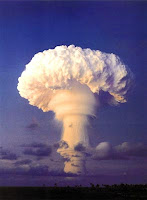 |
| The Federal Reserve -- helping to screw up the economy since 1913 |
There is a very old trick in politics and academia that we should all be aware of.
It's the trick of making things sound far more complicated than they really are. When pols or academics do this, they're kind of saying: "See, this is very complicated. Only WE can handle it. You ordinary people just take it easy and leave it all to us."
Well I'm here to tell you that most of the time this is a load of bull.
Most fields of inquiry can be distilled to simple explanations. How the hell would anyone ever learn a discipline if they had to begin at the advanced level?
Economists are NOTORIOUS for this. And yet, like weathermen and consultants, they can spout a lot of fancy talk, be completely wrong, and still get paid. Try doing that in YOUR job.
So, as a non-economist, with a vested interest in the economy -- just like you -- let me give you my version of what's going on in the United States in terms of our money.
I see it this way:
If a system isn't working to the advantage of the majority, all the tinkering and talk in the world won't fix it. You need a new system.
Now, I'm not here to advocate one system or the other. My understanding is that we have rarely had an economic system be left to operate uncorrupted by greed and elitism: be it communism, capitalism, socialism or anything else you can name. There are some inspiring exceptions. I'll talk about them next time.
I DO believe we need a new type of economic system. But in this blog post let me just take us the first step and address what we already have: We do not have real capitalism. There is not fair and open competition, free markets, or survival of the fittest.
For example, corporations privatize their profits (capitalism) but often socialize their losses (as when taxes from the people are used to bail them out). So forget about this being a capitalist system. It has some semblance of that, but it has taken the worst aspect of capitalism -- a lack of fairness and compassion -- and run with it.
What do I suggest? This:
1/ Don't listen too hard and long to the boss of the Reserve or Obama or the Secretary of the Treasury. They talk nonsense and are in the pockets of people who don't give a damn about you or me.
2/ Slash unproductive, cynical spending like the enormous military budget and corporate tax breaks, and redirect those billions into public works, social services, helping the poor, ramping up education, bolstering (not plundering) social security, and instituting universal health care. That kind of good stuff. And guess what: Unemployment will plummet -- although some rich folks might have a few less mill each year. It's just common sense (and we haven't used terms like "stagflation" or "commodities" or "fiscal policy" or "supply-side economics" to confuse the issue).
3/ Get money out of politics. It's corrupting the system, keeping honest people out of Washington, and, well, wasting money.
4/ Make your voice heard. I say this time and time again. And if we do it, in numbers, the politicians will have to listen. It works on single issues with single politicians; and that's the way to work up to broader change.
We don't need a "stimulus package." We need a reallocation of resources (i.e. our taxes). Sure, there's a lot more that can be done, but that's a big step in the right direction.
And remember, that's just mending the capitalist model which isn't all that great to begin with.
At the base level of our economy are some basic truths. One of them is that we have a very unfair system. The second is that it can be made fairer and more efficient if we cut the leeches out of the picture.
Those who benefit from a system, however corrupt, will tend to defend that system.
And one of their best defenses is a lot of complicated talk that confuses the hell out of us.
Let's call them on it.
Take care,
Adrian Zupp
FOOTNOTE, NOV. 13 I just read that Obama is "offerin" to spend $4.1 billion on the U.S. nuke arsenal. That's a lot of jobs to you and me.
IF YOU FOUND THIS BLOG POST INTERESTING you might also like THE GROSS MISCONDUCT OF THE NEW YORK TIMES

